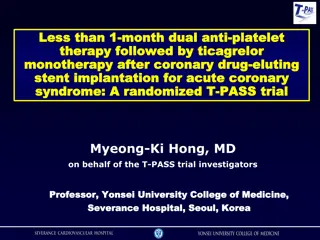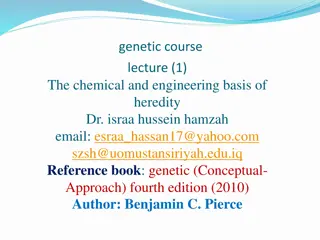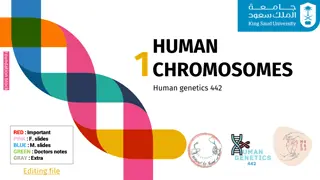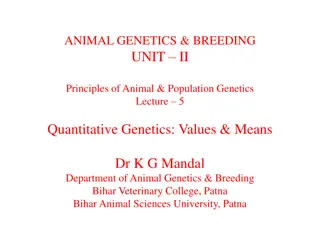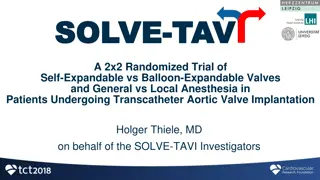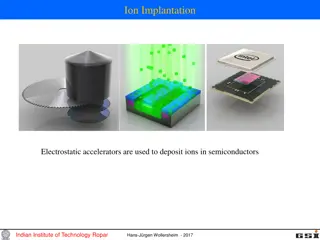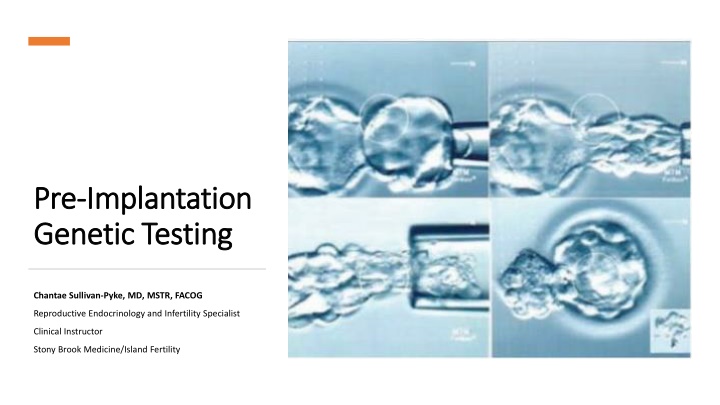
Pre-Implantation Genetic Testing in Reproductive Medicine
Explore the world of pre-implantation genetic testing (PGT) through the expertise of Dr. Chantae Sullivan-Pyke, a specialist in reproductive endocrinology. Learn about the significance of PGT, its types, procedures, and benefits in identifying genetic defects in embryos created through IVF. Discover the various platforms and inheritances associated with genetic conditions like Diamond Blackfan Anemia Syndrome.
Download Presentation

Please find below an Image/Link to download the presentation.
The content on the website is provided AS IS for your information and personal use only. It may not be sold, licensed, or shared on other websites without obtaining consent from the author. If you encounter any issues during the download, it is possible that the publisher has removed the file from their server.
You are allowed to download the files provided on this website for personal or commercial use, subject to the condition that they are used lawfully. All files are the property of their respective owners.
The content on the website is provided AS IS for your information and personal use only. It may not be sold, licensed, or shared on other websites without obtaining consent from the author.
E N D
Presentation Transcript
Pre Pre- -Implantation Implantation Genetic Testing Genetic Testing Chantae Sullivan-Pyke, MD, MSTR, FACOG Reproductive Endocrinology and Infertility Specialist Clinical Instructor Stony Brook Medicine/Island Fertility
Disclosures None
Objectives Option of pre-implantation genetic testing (PGT) prior to trying to conceive Distinguish types of PGT Highlight PGT-M (monogenic) for single gene disorders PGT-M with HLA matching in DBA syndrome Familiar with the in vitro fertilization (IVF) process necessary for PGT
Pre- Implantation Genetic Testing (PGT) Procedure used to identify genetic defects in embryos created through in vitro fertilization (IVF) before pregnancy
Why PGT? May reduce risk of miscarriage due to chromosomal abnormalities that can occur at random in the eggs Option for individuals with genetic condition looking to conceive with an unaffected embryo
Types of PGT PGT-M previously called preimplantation genetic diagnosis/PGD For monogenic (single gene) disorders PGT-A previously preimplantation genetic screening/PGS) General aneuploidy abnormal number of chromosomes in embryos PGT-SR for structural rearrangements
Different Platforms for PGT Sullivan-Pyke, Dokras, Obstet Gynecol Clin N Am 2018
X-linked Inheritance Autosomal Dominant Inheritance Autosomal Recessive Inheritance PGT-M
Inheritance of Diamond Blackfan Anemia Syndrome Autosomal dominant (AD) 45% Sporadic 55%
Genetic Basis of Diamond Blackfan Anemia Syndrome Mutations in genes involved in ribosome biogenesis 11 RPS, 13 RPL genes Ribosome protein chaperones TSR2, HEATR1 GATA1 TP53 Other gain of function gene mutations 70-80% have an identifiable genetic cause PGT-M may be useful
PGT-A https://www.cnyfertility.com/pgt-a-testing/
PGT PGT- -(M) Testing Testing (M)- -HLA HLA PGT-HLA identifies embryos that are HLA compatible with an affected sibling who is needs a bone marrow or cord blood transplant 25% of embryos will be a match PGT-HLA is typically performed in conjunction with PGT-M Further reduces number of embryos available for transfer 12.5% match for AD conditions De Rycke J of Hum Genetics 2020
PGT-M Fertility evaluation Genetics consultation PGT lab collects DNA samples from the couple and appropriate family members and designs a unique test IVF is performed Embryos are tested and frozen Unaffected embryos later can be transferred to a uterus
Fertility Evaluation Pelvic ultrasound (transvaginal) Blood tests Saline ultrasound Semen analysis Hormones: AMH, FSH, estradiol Structural abnormalities with the uterus Sperm Follicle count concentration, motility, shape
Genetics Consultation Genetics Counseling DNA samples collected PGT lab designs a family-specific test
In vitro Fertilization (IVF) Preimplantation Genetic Testing
Embryo Transfer Uterus is prepared with estradiol pills for about 2.5 weeks then injections of progesterone for about 6 days prior to a simple procedure in which an embryo is transferred to the uterus Estradiol and progesterone are usually continued until about the 10th week of pregnancy
IVF Success Rates PGTA tested normal embryos -> ~70% success rate
May need several IVF cycles to obtain embryos that are unaffected and chromosomally normal IVF is not a guarantee of pregnancy Limitations In patients with low egg reserve or egg quality, there may be few or no embryos to test Cost if insurance does not cover
High risk for complications Miscarriage Pre-eclampsia Intrauterine fetal death (IUFD) Retroplacental hematoma Preterm delivery Fetal malformations Pre-conception counseling prior to pregnancy and monitoring by a multidisciplinary team including hematologist and maternal-fetal medicine specialist Prevention of severe anemia Early introduction of aspirin Pregnancies in DBA Faivre et al Haematologica 2006; 91:530-533
Sperm freezing Egg Freezing Other Fertility Considerations Third Party Reproduction with donor eggs or donor sperm Gestational carriers
Take Home Points It s possible to have an unaffected baby via IVF with PGT IVF works! >8 million babies born from IVF worldwide and >1 million in the US In the US in 2022, number of babies born from IVF increased from 89,208 in 2021 to 91,771 (2.5% births) in 2022 PGT used in ~25% of IVF cycles https://www.asrm.org/news-and-events/asrm-news/press- releasesbulletins/ivf-assisted-pregnancies-constitute/
Island Fertility 500 Commack Road, Suite 204 Commack, NY 11725 P 631-638-4600 F 631-520-2561 Thank you!

